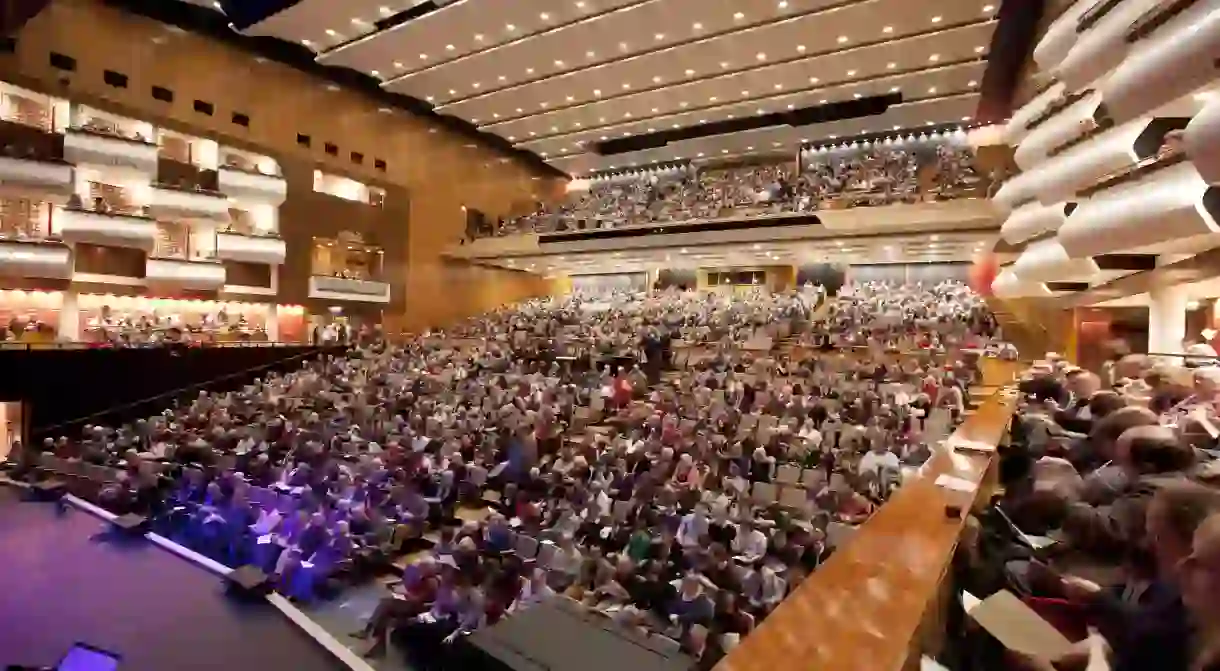Southbank’s London Literature Festival Is a Vanguard for Innovation

Southbank Centre’s London Literature Festival brings together the finest authors and thinkers from across the globe to explore the world’s most pressing issues. But to what extent does the festival champion London’s own literary offspring – and, ultimately, why does it exist?
London is a wellspring for literary culture. Home to a thriving independent bookshop scene, well-preserved literary landmarks and a growing network of community-based literary festivals, it is a bottomless source of inspiration for both writers and readers. Integral to its preservation and progression is Southbank Centre’s London Literature Festival. Taking place over 10 days each autumn, it showcases an array of leading international writers and thinkers to an equally cosmopolitan audience. Launched over a decade ago – as London’s inaugural festival of its kind – it has become the crowning event of the city’s literary calendar.
“In London, it was the very first. It is the place to come and see literary and spoken word talks, in the capital,” says Ted Hodgkinson, head of Literature and Spoken Word at the Southbank Centre. “The reasons the London Literature Festival exists, and more broadly, why Southbank Centre’s literary programme exists, is to distill down the very best literature that’s been published across a range of genres each year and also be a catalyst for conversations around books, poetry and the novel.”
As well as acknowledging the merits of Nobel laureates and Booker Prize-winners, sparking conversation around new forms of literature is central to the festival’s mission. “What London Literature Festival can offer,” says Hodgkinson, “is all of the biggest names in the literary firmament, but it can also be a catalyst for innovation.” Hosting initiatives such as the Creative Future Literary Awards and the Forward Prizes for Poetry – two of which were won by British poets Phoebe Power and Liz Berry in 2018 – the Southbank Centre has become a space to nurture and mould a future generation of writers.

Highlighting the Forward Prizes’s value for emerging poets, Power – who won The Felix Dennis Prize for Best First Collection – said: “You can never be sure how readers will engage with your work when you write it – readers are all different – so knowing that some people have connected with it is truly a joy.” The bespoke spaces of Southbank’s Brutalist complex have also become important platforms for London’s aspiring writers. In particular, the Purcell Room – a newly refurbished, intimate wood-panelled auditorium – is “a really important incubator of literary talents,” says Hodgkinson. “It’s a space that allows us to help writers and poets reach a greater audience than they may have reached before.”
In recent years, Southbank’s Literary programme has taken a uniquely multidisciplinary approach to its events, reimagining the ways in which literature can be expressed, received and interpreted. In April 2018, Nigerian writer Chibundu Onuzo sung extracts from Chinua Achebe’s influential text Things Fall Apart, while during 2017’s London Literature Festival, cellist Ayanna Witter-Johnson responded to letters read by writers Sjón and David Mitchell with musical improvisations. While conversation-based events remain the cornerstones of its programme, these innovative artistic collaborations give the London Literature Festival its edge. “In those instances, another art form adds a different dimension to what’s being experienced,” says Hodgkinson.
Creative and compelling, certainly. But are literary festivals meaningful beyond their immediate artistic circles? And do we really need them? British novelist and Man Booker winner Howard Jacobson is convinced we do, writing that they’re as needed as “clean air”, and a welcome break from “Emojiland”. And with the number of festivals taking place in London on the rise, desire for literary discussion remains ardent.

“One of the things I think literature can offer, and perhaps social media can’t, is a space in which we can fully explore the complications of living,” says Hodgkinson. The festival focus for 2018 is Homer’s Odyssey, a text that has recently been translated by Emily Wilson, the first by a woman since its composition in 700BC. “The opening line of Odyssey, in Emily Wilson’s translation, is ‘Tell me of a complicated man’. That word feels very contemporary to me,” says Hodgkinson.
At a time of heightened complexity, humans are drawn to easy answers. If the world of Twitter offers a simplistic version of events, literature is its antithesis, reinforcing the value of ambiguity and nuance. Because of this, literature remains an unparalleled resource for communicating what life is like for other people, and this is what literary discussion and analysis champions – it generates empathy, and in turn, change. “I think writers have a power to change individuals,” says Hodgkinson. “When we say that writers can change the world, I think what we mean by that is that writers can have a profound effect on one person’s view of the world. And those individual changes are hugely significant.”
The wider significance of the London Literature Festival may not become truly apparent for decades. Just as we look to TS Eliot and Virginia Woolf to tell us about life in the 1910s, it’ll be the speakers on Southbank’s stage in 2018 that future generations call upon to learn about the 2010s. “I absolutely believe writers are doing something on a very profound, almost cellular level, to our way of seeing the world,” says Hodgkinson. “When we look back on this period of time, I think we will look to poets and spoken word artists, to tell us what it was like.”
Southbank Centre’s 12th London Literature Festival runs until Sunday, 28 October. For more information, visit southbankcentre.co.uk













